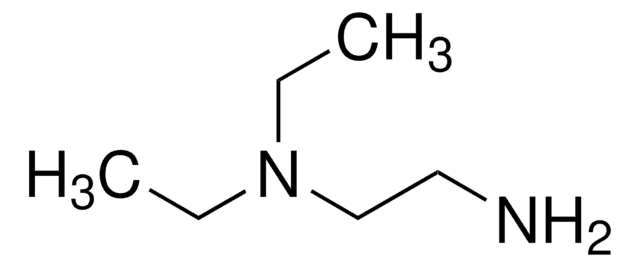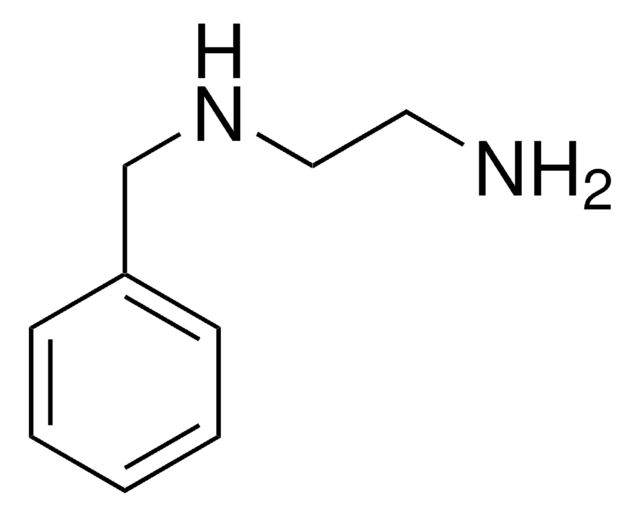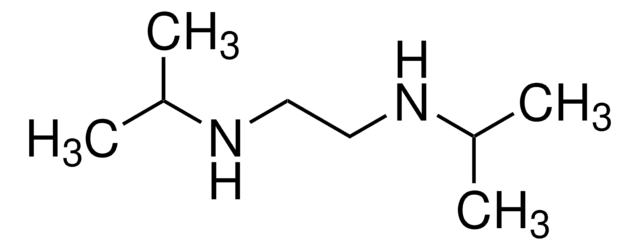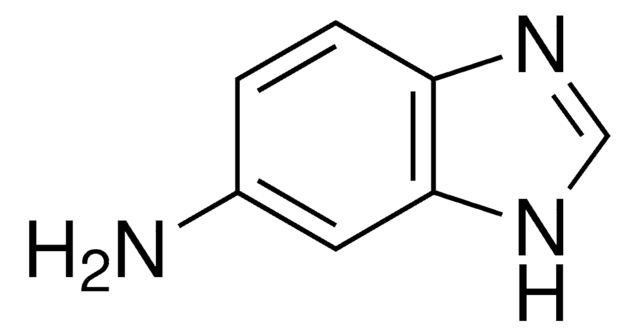127000
N-Ethylethylenediamine
98%
Synonym(s):
2-Ethylaminoethylamine
Sign Into View Organizational & Contract Pricing
All Photos(1)
About This Item
Linear Formula:
C2H5NHCH2CH2NH2
CAS Number:
Molecular Weight:
88.15
Beilstein:
1098272
EC Number:
MDL number:
UNSPSC Code:
12352100
PubChem Substance ID:
NACRES:
NA.22
Recommended Products
Assay
98%
refractive index
n20/D 1.439 (lit.)
bp
128-130 °C (lit.)
density
0.837 g/mL at 25 °C (lit.)
functional group
amine
SMILES string
CCNCCN
InChI
1S/C4H12N2/c1-2-6-4-3-5/h6H,2-5H2,1H3
InChI key
SCZVXVGZMZRGRU-UHFFFAOYSA-N
Looking for similar products? Visit Product Comparison Guide
General description
N-Ethylethylenediamine undergoes condensation with 2-hydroxy-3-methoxybenzaldehyde. It also forms organometallic ruthenium(II) complexes that inhibit the growth in human ovarian cancer cell lines.
Signal Word
Danger
Hazard Statements
Precautionary Statements
Hazard Classifications
Flam. Liq. 2 - Resp. Sens. 1 - Skin Corr. 1B
Storage Class Code
3 - Flammable liquids
WGK
WGK 3
Flash Point(F)
50.0 °F - closed cup
Flash Point(C)
10 °C - closed cup
Personal Protective Equipment
dust mask type N95 (US), Eyeshields, Gloves
Choose from one of the most recent versions:
Already Own This Product?
Find documentation for the products that you have recently purchased in the Document Library.
Customers Also Viewed
R E Morris et al.
Journal of medicinal chemistry, 44(22), 3616-3621 (2001-10-19)
Inhibition of the growth of the human ovarian cancer cell line A2780 by organometallic ruthenium(II) complexes of the type [(eta(6)-arene)Ru(X)(Y)(Z)], where arene is benzene or substituted benzene, X, Y, and Z are halide, acetonitrile, or isonicotinamide, or X,Y is ethylenediamine
Lihua Hu et al.
Scientific reports, 7(1), 3611-3611 (2017-06-18)
Water-soluble hyperbranched polyamine functionalized multiwalled carbon nanotubes nanocomposite (WHPA-OMCNT) was successfully prepared and applied to water remediation in this paper. WHPA-OMCNT was characterized by Fourier transform infrared spectroscopy (FTIR), thermogravimetric analysis (TGA), zeta potential, scanning electron microscopy (SEM) and transmission
Guo-Ping Cheng et al.
Acta chimica Slovenica, 64(1), 261-265 (2017-04-06)
A rarely seen phenolato and azido-bridged polymeric cadmium(II) complex derived from the Schiff base ligand 2-bromo-6-[(2-isopropylaminoethylimino)methyl]phenol (HL) has been prepared and characterized by elemental analysis, IR spectroscopy, and single crystal X-ray diffraction. The Schiff base ligand coordinates to the Cd
Sandip Mukherjee et al.
Dalton transactions (Cambridge, England : 2003), 42(11), 4019-4030 (2013-01-24)
Three new copper-azido complexes [Cu(4)(N(3))(8)(L(1))(2)](n) (1), [Cu(4)(N(3))(6)(L(2))(2)(H(2)O)(2)] (2), and [Cu(4)(N(3))(6)(L(3))(2)](n) (3) [L(1) is the imine resulting from the condensation of pyridine-2-carboxaldehyde with N-methylethylenediamine, HL(2) and HL(3) are the condensation products of 2-hydroxy-3-methoxybenzaldehyde with N,N-diethylethylenediamine and N-ethylethylenediamine respectively] have been synthesized
Bijoy Dey et al.
Chemistry, an Asian journal, 15(11), 1709-1721 (2020-04-18)
The reaction of Fe(NCS)3 prepared in situ in MeOH with 5-X-SalEen ligands (5-X-SalEen=condensation product of 5-substituted salicylaldehyde and N-ethylethylenediamine) provided three Fe(III) complexes, [Fe(5-X-SalEen)2 ]NCS; X=Me (1), X=Br (2), X=OMe (3). All the complexes reveal similar structural features but a very
Our team of scientists has experience in all areas of research including Life Science, Material Science, Chemical Synthesis, Chromatography, Analytical and many others.
Contact Technical Service













